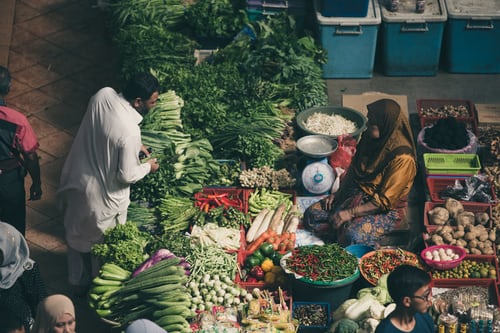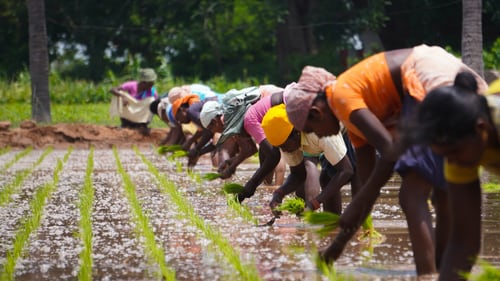A vast majority of India’s farming operations is carried out by marginal farmers, who may or may not be landholders. With small landholding, these farmers face several problems – lack of control on cost, process efficiency, scaling to bigger levels and most importantly, access to finance. Solving these problems is the idea of a cooperative association or a Farmer Producer Organization (FPO). Today, with the Athmanirbhar Bharat model gaining importance, FPOs play an important role in linking farmers producers with agri-food markets or the consumer. More so, during COVID-19 lockdown, these FPOs have adapted to the new situation and focusing on product differentiation and food safety.

Our recent series of webinars have focused on various development related topics, the latest one being the ‘The Future of Farmer Producer Organizations in India’. In this seventh edition of our webinar series, our esteemed panellists discuss the way forward for FPOs and strategies to unearth their potential. Our discussions as captured below focused on how the FPO acts as a catalyst for farmers, equipping FPOs for efficiency and how to achieve profitability.
Here’s a brief on our panellists:
Dr.Venkatesh Tagat is Chief General Manager (Retd) of NABARD who initiated the development of producer organizations in 2014 and has authored a paper on FPOs in 2016.
Mr. Anil Kumar is the founder of Samunnati, driving markets for smallholder farmers through his organization.
Prof Annapurna Neti is Associate Professor at Azim Premji University and comes with vast experience in MSMEs, financial inclusion and producer companies.
Ms.Kusum Balsaraf is the General Manager at Mahila Arthik Vikas Mahamandal Ltd. She has managed several Government schemes and worked in grassroots livelihood promotion.
The discussion was moderated by Mr. N Krishnan, a farming enthusiast and our Chief Operating Officer.
Question: How do FPOs act as a catalyst in changing the farmers' economic situation?
VT: The two most critical problems of farmers are – cutting down on cost of cultivation and setting a better market price for produce. Cutting down on cultivation cost is not easy, as farmers spend most of their money on purchases, while market pricing is not within their control. These are the two points which FPOs help in a macro level – by providing better input supplies through bulk purchases, for instance, seeds and fertilizers are cheaper when bought in bulk. A critical role is also played in getting access to markets.
KB: In addition to the two issues mentioned, we also noticed farmers do not have a risk-taking behaviour as individuals. The cooperative format of FPOs have stringent rules and help farmers who are otherwise illiterate to grow together.
AN: The economy of farming can only be increased through greater participation and control over the value chain. FPOs will help strengthen value chains and creating more jobs.
AK: FPOs help farmers only if the produce is being sold at market prices, if they support farmers in primary processing and finally aid in bringing a little liquidity for their next crop. Only if these factors are covered, can an FPO improve income generation in farming. The role of an FPO is complex; farmers face a loss when they sell right after harvest when prices are lowest. An FPO at this point can offer liquidity to the farmer by ensuring support for selling at higher prices. The set of farmers who come together as the FPO should have access to the working capital as soon as market linkages happen.
Farmers are comfortable farming and not running an institution alongside their regular day. Hence a sound marketing advisory is essential for FPOs to develop their capabilities as an institution.
Question: FPOs are for the farmers and run by the farmers. How are they equipped to navigate complex areas such as credit access, management, governance?
AN: Compliance requirements for FPOs are important. Often it has been seen that farmers who are the producers are also seen as the supplier to the FPO, in some cases they could also be a consumer, the owner and a part of the board of the producer company! It is difficult for these small and marginal farmers to navigate these roles as a professional. Hence it is necessary to have a good resource institution who can handhold and help these producer companies through challenges and compliance requirements.
AK: The main objective of bringing these entities under the Company’s Act is to bring out a governance dimension. Compliance in terms of secretarial/audit dimension is essential to the FPOs as part of their engagement. This makes FPOs stronger in ways like risk mitigation. It is a symbiotic relationship where they are compliant when the farmers are compliant. So investing in these building blocks in the initial days are quite quintessential.
KB: Since company laws are stringent, resource organizations should give handholding support. The future becomes more sustainable when we invest in building capability.
Question: What are the critical elements that contribute to FPO viability (break-even and profitability)? What sort of model works well?
VT: A great starting point for businesses would be on the input angle. Procurement processes and access to market linkages are key to viability. Larger participation can help viability too.
AK: Active participation from members, aggregated demand, creating economic interest among members and importantly communication skills – make FPO models work well.

Question: How do you see the role of women in FPOs and how can their participation be enhanced?
AN: In India, among 7000 producer companies, there are less than 200 women. However, in recent decades, a lot of women collectives have trained them on multiple aspects such as financial literacy and business skills. The challenges seen in forming women FPOs from these Self Help Groups were: finding a common business activity to scale, governance issues and lack of awareness among board members of their responsibilities. Just because we have an SHG architecture we can't just form an FPC. We need an FPO policy to set the structure in place with strong business plans.
KB: Not even 18% of women own lands in India, which indirectly means they are not farmers and membership in an FPO is a question. Unless we create an enabling environment we can’t enable women to participate in an FPO. Other issues include gender biases; women labourers being paid less than men. Also, society diktats that expect women to handle household chores and FPO affairs makes it difficult without family support.
Question: To the extent possible, FPOs have to satisfy their role as both social and economic organization. How do we make the FPOs future proof – in terms of enhancing their financial capability, governance, and contributions to society? In other words, what is the way forward?
VT: An FPO’s viability is higher when it plays a role in ensuring agri-operations and becomes an essential service.
AN: The COVID-19 pandemic has show how important collective processes are, and how important technology helps FPOs take their produce to market. Support is required from the Government to ensure success.
KB: It is important to make FPOs more cohesive entities so they can influence the future of farming.Youth should be brought into this sector and technology plays an important role in this.
AK: Policy level initiatives are bringing in private sector capital flow into the agriculture sector and startups are working directly with farmers. This is an opportunity for FPOs.
Question: The role of youth in FPOs
VT: To attract youth into farming, we need to formalize a more enterprise based set up.
AK: Nature of the activity is important in attracting youth. An ability to handle technology in FPOs boosts the self-esteem of the young. They can deploy new-age techniques to make farming better.
Watch the webinar here!
Key Takeaways from the webinar
1. Focus of FPOs must be improving input supplies first, then on market linkages for the produce and later on processing, value addition and branding.
2. An FPC’s statutory compliance is important, but also difficult to achieve. A two-tier model can help, where Tier-1 FPCs with experience can help others. This arrangement can extend to the procurement of inputs, marketing of produce, capital investments for processing etc. Often, statutory compliance manifests into a better governance system, which in turn keeps a check on better compliance systems to be in place.
3. Women working in FPOs can transform the rural scene in terms of gender equity. Opportunities must be enhanced.
4. Increased participation of youth in FPOs helps in leveraging the role of technology in the farming sector.
Hand in Hand India’s Natural Resource Management wing has been implementing watershed programmes successfully since 2006. We work in the states of Karnataka, Madhya Pradesh and Tamil Nadu. Our team trains farmers in reviving agricultural traditions and promotes organic farming with training support. We also have helped organic farmers come together under a common umbrella called the ‘Indian Natural Farmer Producer Company Ltd. and help them market their products. Read more about our work here.







Your article rightly emphasizes the advantages of producer company registration. It provides rural producers with the opportunity to establish businesses based on cooperation, mutual support, and shared benefits. If you want more information about Producer Company then visit – https://taxesquire.in/producer-company-registration/